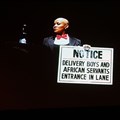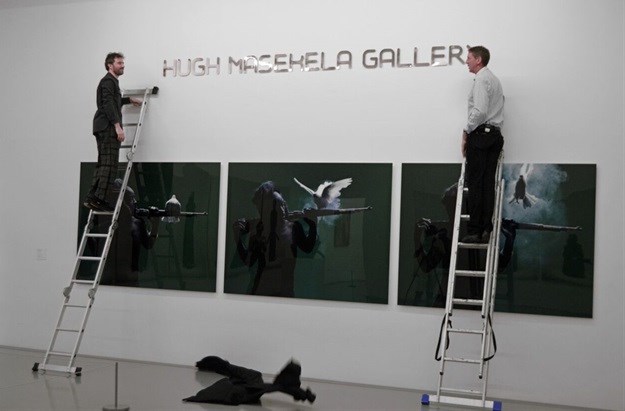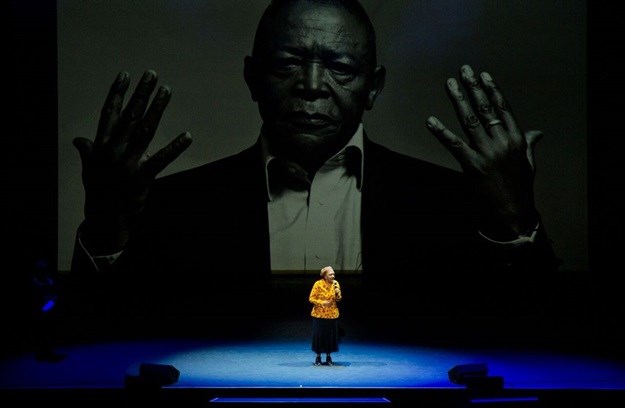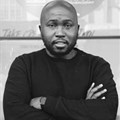
'Advice for the African girl child' - Lebo Mashile
When an interview starts with your interviewee telling you she’s a hair junkie and she loves yours, you’re off to a good start. That’s just what happened when I was one of the lucky few to spend a solo 10 minutes in conversation with Lebo Mashile at last week’s Design Indaba conference. Cue purple-hair swish!
Watch the full video embedded below for Mashile’s thoughtful, impassioned responses in full, or skip to the summarised Q&A below:
 Share how your personal exile story has shaped who you are and the stories you tell.
Share how your personal exile story has shaped who you are and the stories you tell.
Mashile: Demographically, Rhode Island has a very small population one of the highest percentages of immigrants, a melting pot of cultures in the time of hip-hop and Nike and Bart Simpson; and we all met at the level of being American. That shaped my consciousness as a black person, as a feminist, and was good preparation for my return to South Africa as South Africa has a lot of the same demons as America.
 Explain the importance of making design accessible for everyone.
Explain the importance of making design accessible for everyone.
Mashile: We live in one of the most unequal societies on earth. For this strata of society, with access to theatre, literature, the arts and design, festivals and conferences, we’re exposed to the same kind of art as people are exposed to in the Western world.
But for the bulk of our people, who are black, poor, marginalised and disenfranchised, who can’t access services that were promised to them, accessing art is like trying to reach for a cloud. Why do you need art when you don’t have water or education? You need art precisely because you don’t have those things. You need art because we need to heal as a society.So when a kid who is growing up in Gugulethu or Khayelitsha says, ‘I want to be a sculptor,’ their mom has a reference. They can say: “That beautiful thing that matters to me, that matters to so many people – my child does that.”
 Talk us through the importance of mindfulness and meditation in your personal creative process.
Talk us through the importance of mindfulness and meditation in your personal creative process.
Mashile: I deal with a lot of different people and a lot of different energies. I’m 39 now and at different points in my life, that became incredibly overwhelming, taking on all of this energy from so many human beings.
Meditation and my spiritual life help to anchor me. Mindfulness, being able to tap into that and tune into the world and tune into myself, and also realising that in the greater scheme of things, I’m actually really small, and it’s a gift especially as the world I work in is all smoke and mirrors.
 Talk to us about the importance of having a mentor in this industry and your personal creative process.
Talk to us about the importance of having a mentor in this industry and your personal creative process.
Mashile: Well, Pamela Nomvete who directed my Saartjie vs Venus work is the reason I got into acting. She was acting on Generations when I first came back to SA as a kid and seeing this plus-size, curvaceous black woman who was crazy and fearless and relentless, with dreadlocks, on TV was amazing.
I went from watching her on TV and idolising her to seven years later, getting an acting gig where she was the first person to direct me. That led me to Hotel Rwanda and all kinds of theatre work and me being an actress and she’s come back into my life many times and we’ve collaborated many times.
She loves process as much as I do, for the performer, for the artist, for the creative, process is really where the work happens and gets cooked, in its rawest form. You often hate it then love it, because letting people in when the work is still cooking, you see what works and what doesn’t, and it’s an extremely intimate, rare gift to let people share that humanness as we’re so used to giving people perfect, polished products.
 You shared in your Design Indaba presentation that you only felt brave enough to go into this field at the age of 21. How would you encourage the youth to stand up for what they believe in, what’s inside of them and get that spark lit?
You shared in your Design Indaba presentation that you only felt brave enough to go into this field at the age of 21. How would you encourage the youth to stand up for what they believe in, what’s inside of them and get that spark lit?
Mashile: Wow. Africa is the future of the entire world. There are a billion people on this continent, the overwhelming majority of which are under the age of 30, while the West is ageing, getting older. So the future of the planet, the future of humanity is here.
It’s an extraordinary time to be a young person in Africa. The narrative is shifting, Africa is asserting itself in bold and powerful ways.You see this with phenomena like Black Panther, with the success of Design Indaba that draws all these talents from all over the world come to Africa, to Cape Town and saying that “We have an important narrative to share with you, to contribute to the world.” We’re going to see more and more of this with African fashion trending globally, stars like Rihanna referencing Africa at the Grammys, doing the gwara-gwara.
We are there, but we’ve always been there. We just haven’t been able to claim what is ours. Now for the first time, we can, so it’s an extraordinary moment to be alive, to be creative at this time when we’re doing the work of dismantling white supremacy, capitalist patriarchy and African women are essential to that narrative.
The solutions that the continent needs are in the minds and hearts and spirits of young people now, so you’re tremendously important.Everybody will try to tell you that you’re not, that you matter in so much as the price on your jeans matters or your weave matters or the car you drive matters. That’s crap. People are marketing at you because they want to control your mind because you are that powerful.
So if a marketer can decide what you are going to value they can actually decide what the world is going to value. That’s how important you are.
There’s no other generation on the continent that’s been able to tweet and Facebook and share their ideologies with the world. You have tremendous power. Don’t allow other people to decide that the narrative should be important for you, you are the centre of it, everybody wants to be you – Kim Kardashian wants to look like you, people want to dance like you, dress like you, sound like you. People want your story. You are global currency.Never lose sight of that, even if you’re poor or disenfranchised. You are important. You matter.
Design Indaba’s latest legacy project for Hugh Masekela
Mashile says as much as it’s important to attend and participate in events like Design Indaba, we also need to make the language accessible and spread the overall message. Last year’s Arch for Arch installation is an example of this.

Public art, being able to work as an artist on commissioned work that ordinary people are going to walk past on the way to the taxi rank or the office – sometimes that’s the only fine art that people will ever see.Music has a similar healing role to play, and this year’s conference finale announcement that the newly named ‘Hugh Masekela Gallery' at the Zeitz Mocaa is now open to the public – ties in with this sentiment. Mashile said in the Design Indaba conference closing, “We started the year off with some colossal losses – the first national poet laureate of South Africa Prof Keorapetse Kgositsile, followed shortly by musical icon, Hugh Masekela, lauded as the father of SA jazz, who was also a massive friend of Design Indaba.”
The Zeitz Mocaa initially approached Ravi Naidoo with the idea of naming a wing of the gallery after the Design Indaba, as a thank you to the Design Indaba for the vital role it has played. Instead, Naidoo asked if the honour could rather be bestowed on Masekela.

Naidoo explained, “I believe it is fitting that a cultural icon such as Hugh Masekela is honoured by yet another cultural icon such as Zeitz Mocaa, which has rapidly garnered global renown and several awards for architecture since its launch.”
In closing out the conference, Naidoo added:
Masekela has been such a personal inspiration over the years. One thing I learned from him was generosity, he was probably one of the most connected South Africans I know... If he missed your call, he would return it within 24 hours, without fail.How many of us less-busy individuals can claim the same respect for others’ time? Mashile points to the power of African’s first contemporary art gallery honouring the legacy of activist and artist Masekela as a positive pondering point for the next generation.
About Leigh Andrews
View my profile and articles...




